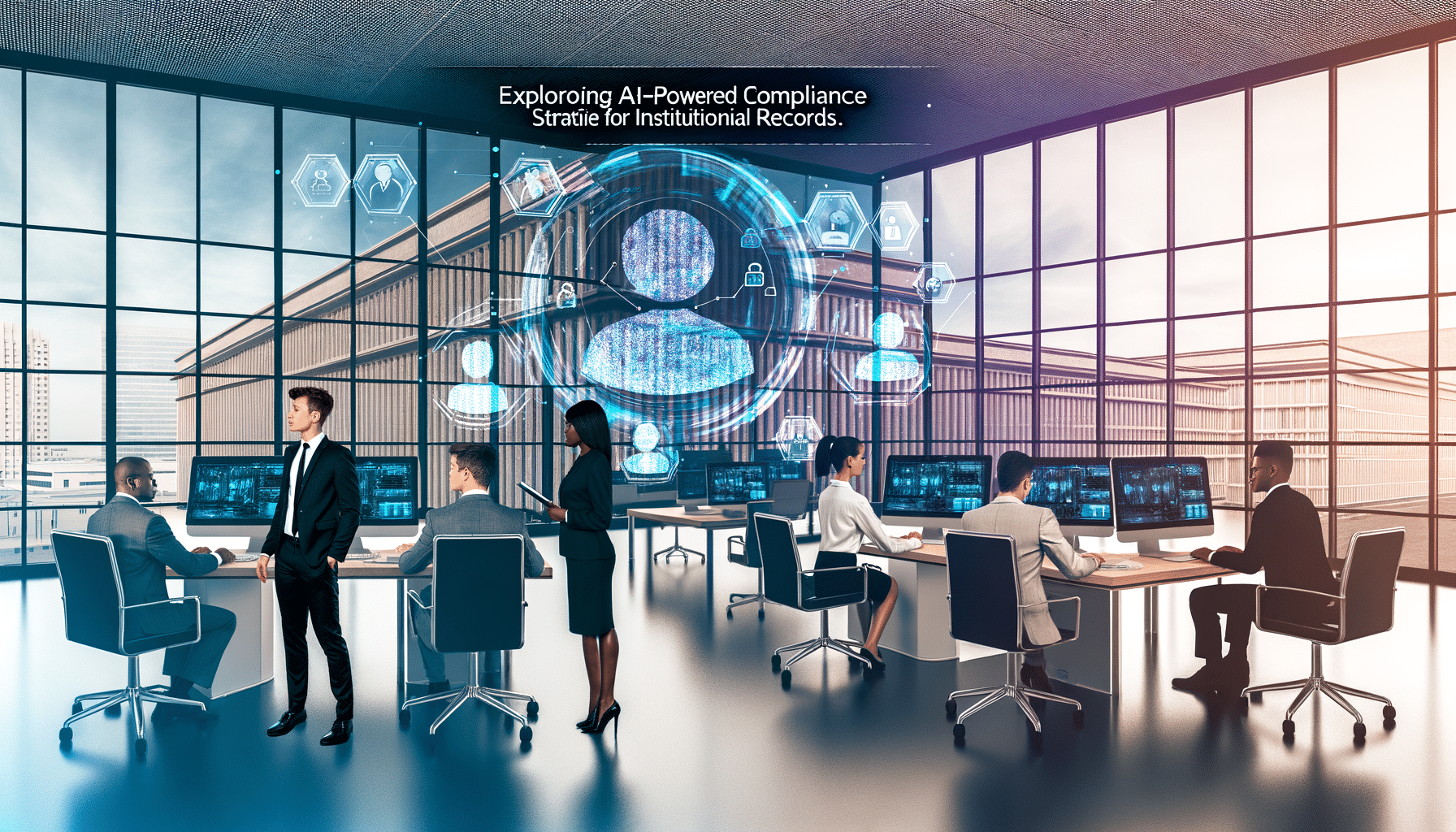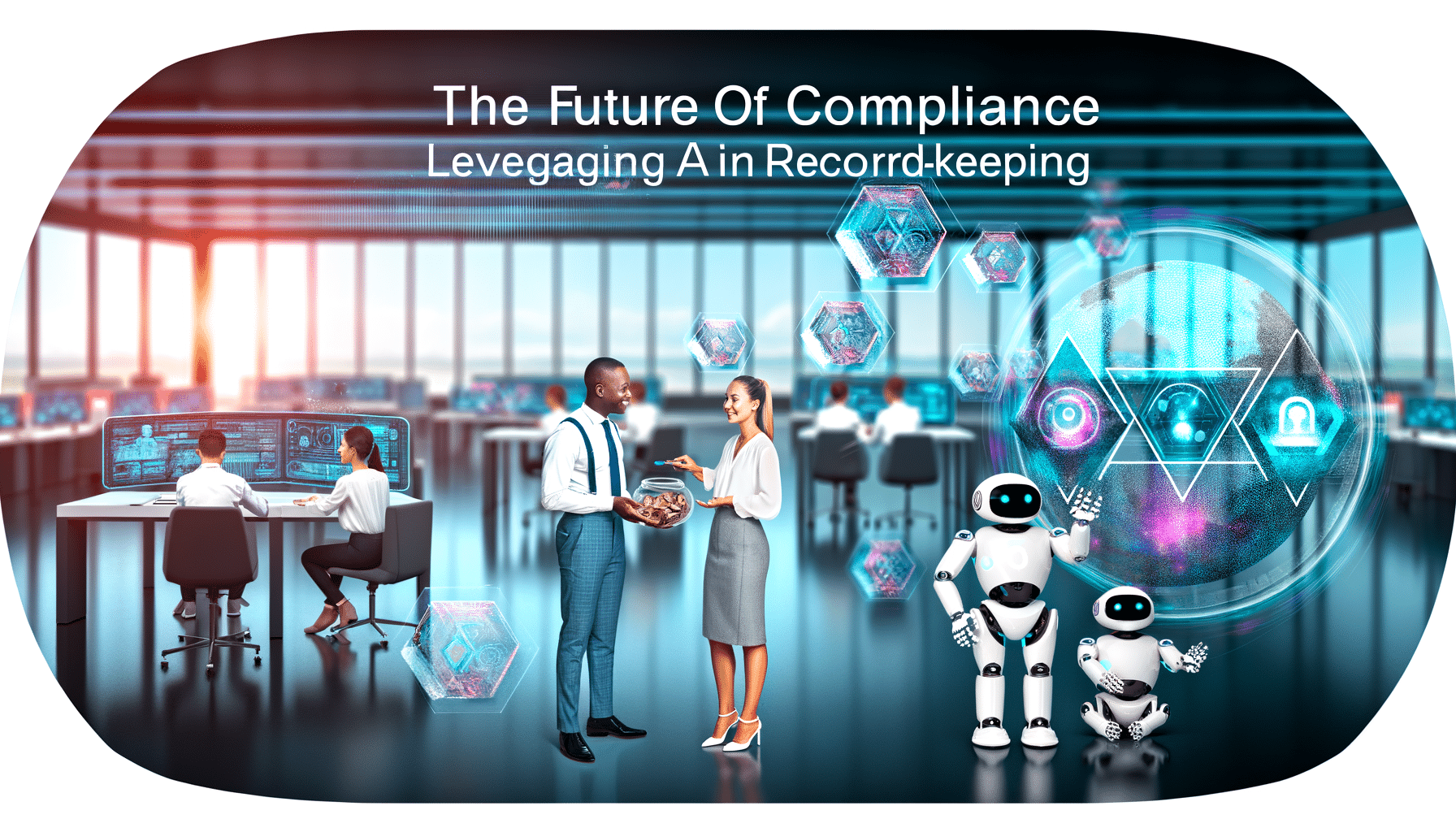- Compliance Innovations
- August 4, 2024
Exploring AI-Powered Compliance Solutions for Government Records

As the founder of RecordsKeeper.AI, I’ve had a front-row seat to witness how AI continues to transform and innovate various sectors, including record management for government departments. The age of digital transformation has heralded significant advancements, and today, I’m excited to delve into how AI-powered compliance solutions can revolutionize the way government records are maintained and managed. With my passion for tech innovation and a drive for simplifying complex processes, I believe we’re on a journey to redefine traditional record-keeping, making it not just a function, but a strategic advantage.
Understanding the Need for Innovation in Government Records
In the government sector, managing records and ensuring compliance with regulatory standards is a task of staggering scale and complexity. Traditional methods often fall short, leading to inefficiencies and regulatory non-compliance risks. Enter AI-powered compliance—an intelligent approach that not only addresses these challenges but also anticipates future needs.
AI has the capacity to automate and refine the management processes for government records. Its ability to classify and tag information through machine learning reduces human error, ensures regulatory adherence, and enables new standards for precision and reliability.
The Role of AI in Streamlining Compliance Processes
In my journey with RecordsKeeper.AI, I’ve seen firsthand how our AI-driven platform revolutionizes the compliance landscape. Here’s how AI can make a difference:
- Automated Categorization & Retrieval: AI tools are adept at processing vast data sets, automatically categorizing and tagging records, making them effortlessly retrievable via natural language queries.
- Enhanced Data Security: Through secure AI-powered data rooms, sensitive files can be shared with controlled access, enhancing privacy and real-time activity tracking.
- Regulatory Compliance: With built-in compliance management, AI ensures that workflows adhere to standards such as GDPR, HIPAA, and SOX by automating these processes and eliminating manual impediments.
The Impact of AI-Compliance Integration
The prospect of integrating AI into compliance solutions offers compelling advantages for government departments:
- Improved Efficiency: By automating repetitive tasks, government entities can significantly cut down on time spent on manual record handling, allowing personnel to focus on mission-critical activities.
- Decreased Costs: Through AI’s ability to streamline operations, there’s a reduction in the resources expended on maintaining compliance and error rectification.
- Real-Time Monitoring and Reporting: Utilize sophisticated algorithms to ensure real-time monitoring and generate audit-ready reports at a mere fraction of the previous time.
Blockchain: The Backbone of Tamper-Proof Records
While AI strengthens compliance and procedural efficiency, Blockchain technology offers the crucial backbone for maintaining data integrity. It’s something we’ve successfully integrated into RecordsKeeper.AI, providing tamper-proof and immutable records. The immutable nature of Blockchain ensures that once data is stored, it cannot be altered retroactively, which is pivotal in public sector record-keeping. This assurance is vital for ensuring trust and transparency within government operations.
Security and Policy Management: A Dual Approach
Government records are often subject to stringent data retention and deletion policies. AI solutions like ours enable automatic enforcement of these policies, thereby simplifying adherence to regulations and minimising human intervention in policy enforcement.
The same intelligent oversight applies to security management. AI’s advanced pattern recognition capabilities identify and respond to anomalies that may indicate security threats faster than traditional methods. In fact, this dual approach ensures a seamless transition from a reactive to a proactive compliance mindset.
Looking Forward: Embracing AI Compliance in Government
The journey toward AI-powered compliance is not just a possibility—it’s a necessity for the modern government. As we stand at the forefront of this tech-driven renaissance, my vision for the future is clear: to continue to harness AI advancements to create smarter, more secure, and compliant record management solutions. We have a responsibility to not only implement these solutions but to continue innovating and adapting them to meet the ever-evolving needs of governance and compliance.
In conclusion, as we look to the future, I urge governments to embrace these solutions. By doing so, they’ll not only streamline their record management processes but also unlock new levels of efficiency and security. Follow my entrepreneurial journey and insights into AI and record management innovation by staying connected with RecordsKeeper.AI—where we transform challenges into opportunities for progress.
Toshendra Sharma is the visionary founder and CEO of RecordsKeeper.AI, spearheading the fusion of AI and blockchain to redefine enterprise record management. With a groundbreaking approach to solving complex business challenges, Toshendra combines deep expertise in blockchain and artificial intelligence with an acute understanding of enterprise compliance and security needs.
Related Posts

The Future of Compliance: Leveraging AI in Record-Keeping
Discover how AI will shape compliance and record-keeping practices in the coming years.
- August 7, 2023
Archives
- December 2024
- November 2024
- October 2024
- September 2024
- August 2024
- July 2024
- June 2024
- May 2024
- April 2024
- March 2024
- February 2024
- January 2024
- December 2023
- November 2023
- October 2023
- September 2023
- August 2023
- July 2023
- June 2023
- May 2023
- April 2023
- March 2023
- February 2023
- January 2023
- December 2022
- November 2022
- October 2022
- September 2022
- March 2019
Want to get more content like this?
Signup to directly get this type of content to your inbox!!
Latest Post
Organizing External Auditor Access
- December 22, 2024
Document Control in Manufacturing Plants
- December 21, 2024
Handling Rush Financial Report Requests
- December 20, 2024
Managing Record Access After Staff Changes
- December 19, 2024





